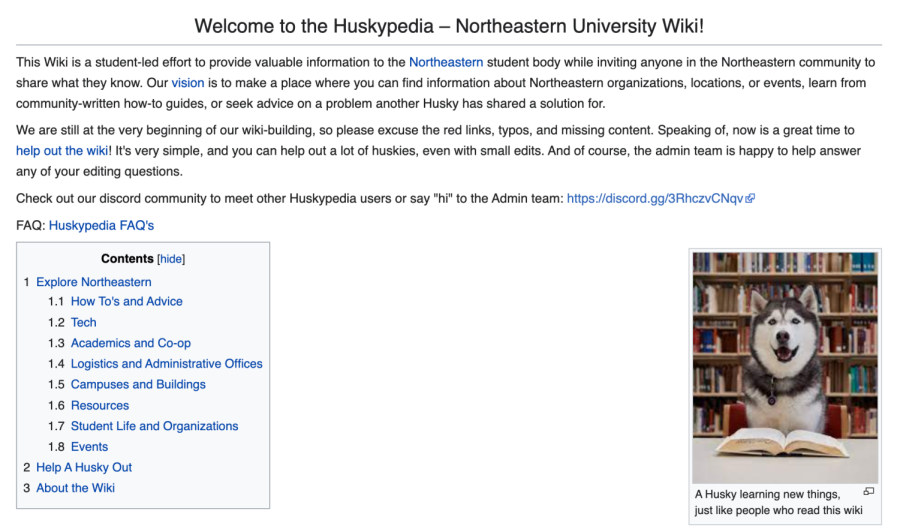Student-created Huskypedia aims to provide resources, information to students
Northeastern students Evan Forcucci and William Cutler have created Huskypedia, a student-edited and maintained set of resources to act as an alternative to university-run sites like the Student Hub. Still in its infancy, the site has space for interested Northeastern students to add information about topics ranging from a freshman survival guide to the annual Underwear Run. Photo courtesy of Huskypedia.
November 1, 2022
Dissatisfied with Northeastern’s existing online resources for student information, two students set out to create their own.
When Evan Forcucci, a first-year electrical engineering student at the time, still couldn’t find his Stetson West mailbox in April 2022, he promptly took to the Northeastern subreddit, r/NEU, to rant about his moment of frustration and declared, “Northeastern needs a Wiki.”
After laying out his vision for a centralized, student-maintained source of information for students — a Wikipedia specific to all things Northeastern — Forcucci gained the interest of William Cutler, a fellow Redditor and current fourth-year computer science and physics combined major. Together, the two brought the project to life and created Huskypedia.
Formatted and functioning just like a regular Wikipedia page, Huskypedia aims to provide an encyclopedia of information to the Northeastern student body — ranging from a survival guide for incoming freshmen to guidance on the co-op process to a list of the quietest places on campus to study — while allowing anyone in the community to contribute to the page by adding or editing information.
But what the site doesn’t show is that the creators intended the community-oriented platform to largely serve as an alternative to official university resources, namely the Student Hub.
“Being a first-year involves learning a lot of different weird things about Northeastern — some of which are readily available pieces of information, but others are just scattered across all these random websites that Student Hub sometimes links to, [but] sometimes doesn’t,” Forcucci said. “It’s all fragmented and hard to navigate easily.”
But rather than compensating for the technical inefficiencies of the Student Hub, Huskypedia’s mission is more about capturing the nuances of actual student life and culture at Northeastern. Despite the university’s advertisement of the Student Hub as “designed for the student experience, by the students,” Forcucci notes, “there is some information that only students would think of to be relevant to share that the administration might not.”
While students couldn’t learn about unique Northeastern traditions such as the annual Underwear Run on the Student Hub, they certainly can on Huskypedia.
Huskypedia is not the first student-created platform borne out of frustration with Northeastern’s official portal for university resources.
Before the Student Hub replaced myNortheastern, a group of students created Husker, which serves the same purpose of helping students navigate the plethora of information needed for daily college life, but primarily by acting as a kind of “linktree.”
While Husker is useful for getting to a specific place with a neatly categorized link, such as the financial aid website or the housing portal, the Huskypedia creators say their site is distinct for having actual written information and content about these resources.
Still, a crucial feature of both sites is allowing anyone in the Northeastern community to contribute to the page, and it is this democratic aspect that Cutler and Forcucci kept in mind when creating Huskypedia.
Despite their STEM-centered disciplines, the duo told The News that instead of coding the site, they used Miraheze, a free Wiki hosting platform that uses the same software as Wikipedia.
“If you read online about ‘hey I want to make a Wiki, how do I get started,’ the advice is [to] not try to do the Wiki yourself and have it all as a nice art display that people can come and visit — that’s not the point,” Cutler explained. “You start and you write just enough of the structure so that people who come on and are interested in helping can then add to it.”
As such, Huskypedia — still in its infancy — is streaked with red-colored links indicating that the content for that section is empty, and therefore in need of someone to add information to it.
Vanita Fitzwater, a fourth-year politics, philosophy, and economics major, has been assisting the creators with their marketing approaches for the site. But as a viewer, Fitzwater emphasized the importance of Huskypedia leaving a space for legacy.
“I’ve always thought that there’s been a need for students to be able to have some kind of a resource that they’re able to rely on, that’s been constructed by other students who have come before them,” Fitzwater said. “It’s a great opportunity for upperclassmen to be able to contribute to something and know [that] their experiences are being documented in such a way that is going to be helpful for other people who come into Northeastern.”
In the long run, Huskypedia is meant to live on its own in the Northeastern community, rather than remain the personal project of Cutler and Forcucci.
“We don’t want to just be the Reddit [computer science] kids making the little Wiki thing in the corner,” Forcucci said. “We want this to be a mainstream thing that everyone can use, contribute to and feel comfortable referring to [in order] to access university resources.”


















